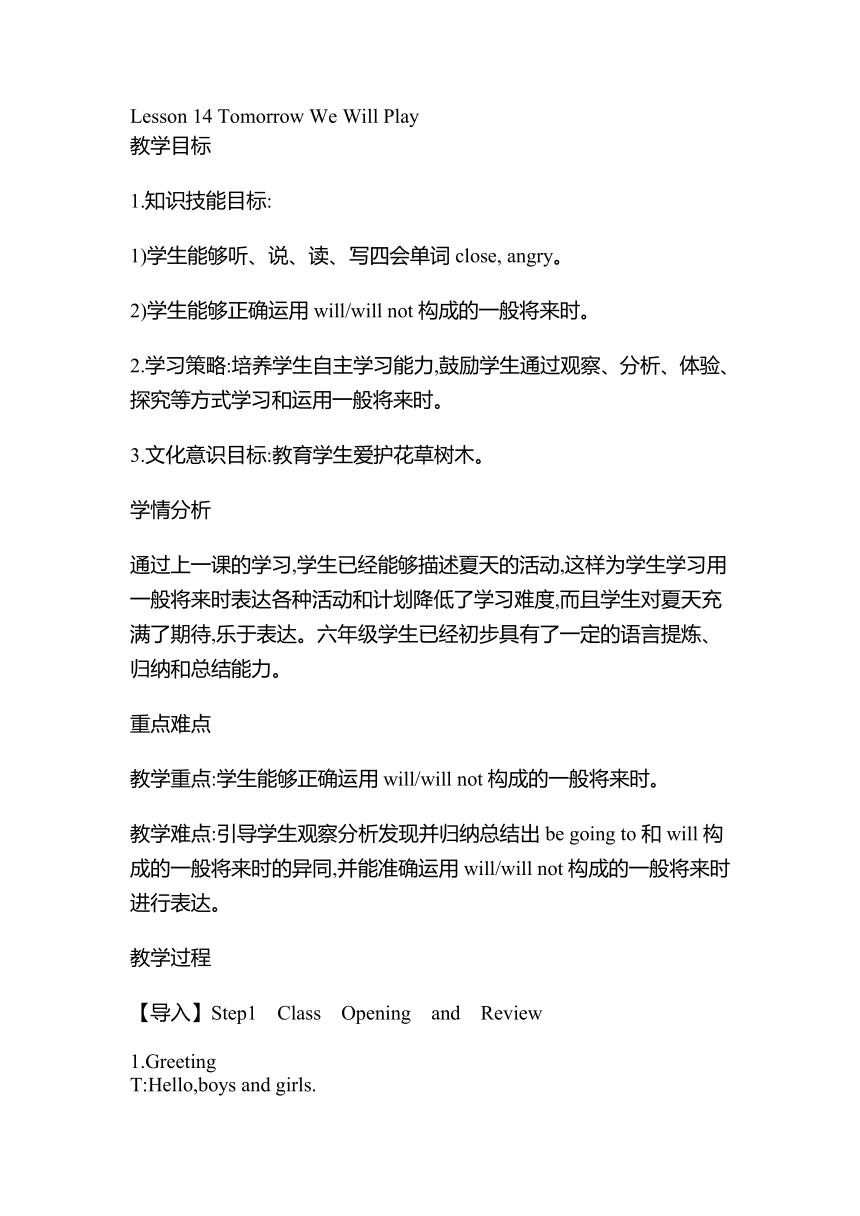
Lesson 14 Tomorrow We Will Play 教学目标 1.知识技能目标: 1)学生能够听、说、读、写四会单词close, angry。 2)学生能够正确运用will/will not构成的一般将来时。 2.学习策略:培养学生自主学习能力,鼓励学生通过观察、分析、体验、探究等方式学习和运用一般将来时。 3.文化意识目标:教育学生爱护花草树木。 学情分析 通过上一课的学习,学生已经能够描述夏天的活动,这样为学生学习用一般将来时表达各种活动和计划降低了学习难度,而且学生对夏天充满了期待,乐于表达。六年级学生已经初步具有了一定的语言提炼、归纳和总结能力。 重点难点 教学重点:学生能够正确运用will/will not构成的一般将来时。 教学难点:引导学生观察分析发现并归纳总结出be going to和will构成的一般将来时的异同,并能准确运用will/will not构成的一般将来时进行表达。 教学过程 【导入】Step1 Class Opening and Review 1.Greeting T:Hello,boys and girls. S:Hello,Miss Zhao. T:How are you today S:I’m fine, thanks. And you T:I’m very well. Are you ready for our class S:Yes. T:Everyone has a piece of paper on your desk. Here are your tasks and a chart about “self-evaluation”. In this class, please listen carefully, speak loudly, read and write. If you do well, you can get one star. Are you clear (设计意图:六年级学生已经具备一定的学习能力,采取自我评价和小组评价结合的形式,督促学生在课堂上认真听,大声说,读和写。) 2.Enjoy a song”What are you going to do ” T:First,let’s enjoy a song. Listen carefully, please remember what are they going to do T:The song is very interesting.What are they going to do S:They are going to read books/watch TV/visit friends/have a busy weekend/be a good student. (设计意图:利用一首活泼欢快的歌曲导入,迅速吸引学生的注意力,调动了学生学习热情,又复习了be going to构成的一般将来时,同时也为本课的新授内容做了铺垫。) 【讲授】Step2 New Concepts 1.will T:Look at these sentences. T:We also can say they will read books. They will watch TV. They will visit friends. T:Compare these sentences, what can you find S:Are going to变成了will. T:Can you guess the meaning of”will” S:将要。 (板书 will 带读) T:”Be going to” and “will” have the same meaning. T:Read them together. T:Here are some sentences. Change them into another way. S1:They are going to have a busy weekend. They will have a busy weekend. S2:They are going to be good students. They will be good students. S3:I’m going to draw pictures. I will draw pictures. S4:He is going to fly a kite .He will fly a kite. S5:She is going to have lunch. She will have lunch. S6:We are going to play sports. We will play sports. T:Which one is easier /Which one do you like better S:B. T:Why You can speak Chinese. S:A主语变化,be动词也要有相应的变化;B不用 T:We should pay attention to the differences of ”be”. T:Look again, what’s the same between these two parts S:意思相同。 T:How about the form of verbs S:Be going to和will后边都用动词原形。 T:We should use the verb’s original form. (设计意图:老师将be going to句型转换成will句型,让学生观察、分析,初步归纳出了will的意思,再通过替换练习,使学生对比、总结出两种结构的异同,更深入的理解和运用了该知识点。) 2.What will you do tomorrow T:What ... ...
~~ 您好,已阅读到文档的结尾了 ~~

